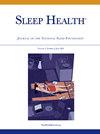Perceptions of sleep and sleep research among African American adults
IF 3.4
2区 医学
Q2 CLINICAL NEUROLOGY
引用次数: 0
Abstract
Objectives
Understanding contributors to poor sleep and effective interventions to improve sleep among African Americans remain lacking due to their under-representation in sleep research. This study aimed to examine this population’s sleep-related perceptions, as well as facilitators, barriers, and willingness to participate in sleep research.
Methods
African American men and women (n = 36, 53.4 ± 14.4 years [mean ± SD]) from the Greater Baton Rouge area were recruited and assigned to a focus group. Five 60- to 90-minute focus group sessions were conducted using a semistructured interview guide. Prompts were related to sleep and sleep research. Each session was recorded, transcribed, and coded for content analysis to capture themes in the discussions.
Results
Thirty participants reported a total sleep time less than or equal to 6 hours most nights of the week. Participants were aware of the importance of sleep for physical and mental health and were interested in improving their sleep. Most participants indicated a willingness to participate in sleep research. Perceived benefits included increased knowledge on how to improve sleep, identification of personal triggers that may contribute to poor sleep, and improvement in quality of life and health. Barriers to sleep research participation included lack of trust, time commitment, study procedures, and inability to change their habits. Conversely, building trust and community presence were seen as facilitators to sleep research studies.
Conclusions
African Americans displayed knowledge related to importance of sleep and its relationship with health outcomes. Despite a long history of mistrust of medical researchers among African Americans, there is an interest in sleep research participation.
非裔美国成年人的睡眠认知和睡眠研究。
目的:由于非洲裔美国人在睡眠研究中的代表性不足,了解导致睡眠不良的原因和有效的干预措施来改善他们的睡眠仍然缺乏。这项研究旨在调查这一人群的睡眠相关观念,以及参与睡眠研究的促进因素、障碍和意愿。方法:从大巴吞鲁日地区招募非裔美国男性和女性(n = 36, 53.4±14.4岁[mean±SD]),并将其分配为焦点组。使用半结构化访谈指南进行了五次60至90分钟的焦点小组会议。提示与睡眠和睡眠研究有关。每次会议都被记录、转录和编码,以便进行内容分析,以捕捉讨论中的主题。结果:30名参与者报告一周中大多数晚上的总睡眠时间少于或等于6小时。参与者意识到睡眠对身心健康的重要性,并对改善睡眠感兴趣。大多数参与者表示愿意参与睡眠研究。可感知的好处包括增加了关于如何改善睡眠的知识,确定了可能导致睡眠不良的个人诱因,以及改善了生活质量和健康状况。参与睡眠研究的障碍包括缺乏信任、时间承诺、研究程序以及无法改变他们的习惯。相反,建立信任和社区存在被视为睡眠研究的促进因素。结论:非裔美国人表现出与睡眠重要性及其与健康结果的关系相关的知识。尽管非洲裔美国人对医学研究人员的不信任由来已久,但他们对参与睡眠研究很感兴趣。
本文章由计算机程序翻译,如有差异,请以英文原文为准。
求助全文
约1分钟内获得全文
求助全文
来源期刊

Sleep Health
CLINICAL NEUROLOGY-
CiteScore
6.30
自引率
9.80%
发文量
114
审稿时长
54 days
期刊介绍:
Sleep Health Journal of the National Sleep Foundation is a multidisciplinary journal that explores sleep''s role in population health and elucidates the social science perspective on sleep and health. Aligned with the National Sleep Foundation''s global authoritative, evidence-based voice for sleep health, the journal serves as the foremost publication for manuscripts that advance the sleep health of all members of society.The scope of the journal extends across diverse sleep-related fields, including anthropology, education, health services research, human development, international health, law, mental health, nursing, nutrition, psychology, public health, public policy, fatigue management, transportation, social work, and sociology. The journal welcomes original research articles, review articles, brief reports, special articles, letters to the editor, editorials, and commentaries.
 求助内容:
求助内容: 应助结果提醒方式:
应助结果提醒方式:


